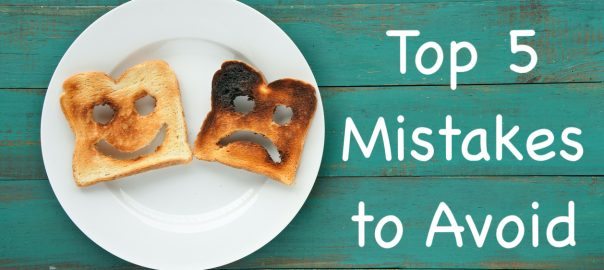
Top 5 – Mistakes to Avoid in the Keto Diet
Avoid these popular mistakes for best keto results
The ketogenic diet is a high-fat, low-carb eating plan. Eating more fats and very few carbs puts your body into ketosis, a metabolic state where your body burns fat instead of carbs for fuel, which leads to rapid weight loss. The macronutrient formula will vary for everyone, and we recommend seeking advice from a professional for your formula. In general, it revolves around a diet that consists of 75% fats, 20% protein, and 5% carbs.
This article will help you stay in keto to reach your goals faster and help you avoid unnecessary speedbumps along the way. And, if you quit the keto diet and can’t put a finger on the reason why these tips might encourage you to try again or at the very least fulfill your curiosity.
Without further ado, here are the Top 5 keto-diet mistakes and how to avoid them.
Eating the Wrong Fats for Too Long (Omega-3 vs Omega-6)
The keto diet is simple but not easy, and sometimes when we go on the keto diet, we don’t fully understand what we’re doing. Some credible sources will recommend you load up on bacon, steak, hamburgers, cheeses, and other delicious high-fat foods. But, with these foods, our Omega-6 balance goes through the roof.
In the beginning, you might not notice a problem, but once it’s a routine of 30, 60, or even 90 days, it can become a problem. At this point, we would have too many Omega-6 fats in our body and they will start to supersede the Omega-3 fats. It’s important to note that Omega-6 fats are not bad, but it becomes an issue when there’s too much of them.
Generally speaking, the most common Omega-6 is linoleic acid. Linoleic acid converts into arachidonic acid and arachidonic acid creates eicosanoids, which are pro-inflammatory. To simplify, Omega-6 triggers inflammation, and that’s good when it needs to be triggered, but if we have too much, it triggers inflammation all the time. That’s why some people refer to Omega-3s as anti-inflammatory because they counteract Omega-6.
This tip can be confusing, but we’re here make things simpler. To summarize, if you’re having a lot of meat and poultry, or other fats with plenty of Omega-6 fats, be sure to balance your diet with Omega-3 because it won’t come naturally in all foods. Eating too many options strong in Omega-6 could contribute to inflammation and even spark some depression. If this is you, try at least 5 or 6 grams of Omega-3 supplements per day. This tip will help you balance your mind and body on the keto diet.
Lack of Energy – Not Personalizing to You
A lack of energy on the keto diet can be a little controversial because professionals will claim that when your body is in ketosis, your liver creates ketones and places them in your bloodstream. These ketones are a super fuel created from fat, and you will likely notice increased energy in your body. However, there are instances that people quit the ketogenic diet because they just don’t have any energy.
The ketogenic diet is very efficient but also very sensitive. Some people who notice a lack of energy on the keto diet might try increasing their fat intake to bring in more ketones, and in theory that makes sense, but don’t forget that food, in general, is energy, and fats aren’t the easiest thing for our bodies to digest. If increased fat intake is not working for your energy levels, we recommend bringing in more protein. Keep in mind, protein doesn’t have to be animal products, you can have plant-based proteins like chickpeas and tofu.
If you exercise heavily on the keto diet, chances are you need more protein because your muscle recovery isn’t getting the proper glycogen resynthesis that it used to get. Glycogen resynthesis is the scientific term of recovery and restoration to your muscles after prolonged exercise. If you’re experiencing a lack of energy on the keto diet, there’s no reason to think that excess protein will kick you out of ketosis because the protein will only do what it needs to do to heal your body. It’s a demand-driven process.
Holding Yourself Back from Social Gatherings
The keto diet is your journey, and if the restaurant on Friday night has keto options, that’s great, and if it doesn’t, eat a little before. If the Saturday backyard party is providing carb-loaded subs, then bring a prepared meal, and so on. It may not show on the surface, but the people around you are proud that you’re working on a goal and there’s no reason to be ashamed of that!
There will be times on the keto diet that challenge your reasonings. But, don’t let it reflect on your social gatherings, or anywhere for that matter. If you’re unsure about the foods served at events, pack your own. Good friends, family, and colleagues will support your drive for a better you, and in some great occasions, they may speak with you in advance to provide meal options, especially if they have a quick and easy fix!
Another point to mention is that the keto police don’t exist. You’re not going to keto jail if you fall off for a few days. You can take a trip with your friends to Vegas, or with your family to the Caribbean. For the most strict dieters, there are solutions to stay on keto. If you’re an advanced low-carber, you can do a 20 hour fast, so you have the flexibility for carb intake and still stay in keto. If you’re a beginner, it’s not the end of the world to get off the diet for a couple of days. You can give yourself a mental break and continue back when you’re ready. There is still plenty of room for your success on this journey, so don’t hold yourself back.
Lack of Carbs
There’s a myth that you don’t need carbohydrates to survive, and the focus of the keto diet is to lower your carb intake, but is it possible to go too low? The truth is that you don’t need to eat carbohydrates to survive, and that’s because your body will always find a way to create carbohydrates.
Your body will always have a demand for carbohydrates, even though it’s just a small amount (10-15%). So how does your body create carbohydrates if you’re not eating them? The answer is found in a series of complicated science terms, like gluconeogenesis, but in its most simple form, your body will create carbs from the extra consumed protein or even from your muscle tissue.
If you’re eating too few carbs, there can be an effect in where tryptophan isn’t getting to your brain. Tryptophan is an essential amino acid that turns to serotonin, which provides an uplifting boost in your mood. And, tryptophan travels to your brain through the breakdown of carbs in your body.
The problem with eating too few carbs is that there is a possibility to start feeling depressed. To avoid this feeling, you can incorporate foods with high serotonin, like eggs, pineapple, tofu, salmon, nuts and seeds, and turkey. But it might be a better idea to include MCT oil into your diet because it can directly boost tryptophan levels in the brain, leaving you with only the good benefits of keto.
Boredom
It’s a stretch to call boredom a mistake, but if you’re falling off the keto diet because you’re getting tired of the same meals over again just remind yourself this problem is not a direct cause of the keto diet because it’s possible to get tired from other variations of foods.
The solution here is to try self-experimentation. Try vegan keto, try intermittent fasting experiments, try the keto diet with only meat, or pescatarian-style, or Mediterranean-style keto. The idea is to have fun with it, just like any other diet! Click here to see our collection of low-carb recipes.
What do you think?
This is our breakdown of the most popular keto diet mistakes and how to avoid them. In summary, Omega-3 supplements are an essential tool to include in your journey to help balance your Omega-3 and Omega-6 fats. Personalizing keto to you is so important to keep your energy levels healthy, especially to attend your favourite social gatherings with work and friends. And keep an open mind to try new products like MCT oil to keep your brain happy and healthy when you’re craving those carbs!
We can help you avoid as many mistakes as possible, but it’s important to remind yourself why you’re on keto because not understanding the reason you’re doing it, your “why” can be the biggest reason to fail. And remember, your body is the ultimate truth teller… listen to it and there’s a good chance you’ll never want to go back to the bad foods you were eating before!
Do you agree with our list? Did we miss anything? Share your keto diet experiences by letting us know in-store or on Facebook or Instagram.






